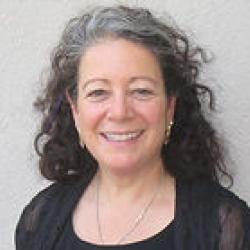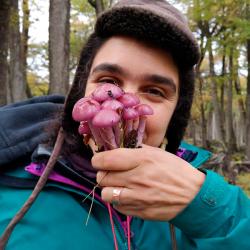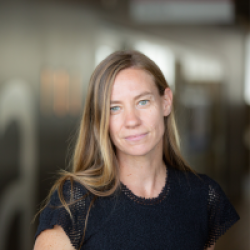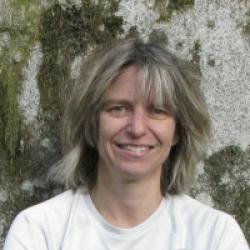-
Judith Berman
Judith Berman is a Professor in the Department of Molecular Microbiology and Biotechnology at Tel Aviv University in Israel and is The Nathan Galston Chair for Anti-Microbial Drug Research. She is interested in how genomes evolve and change in response to stress. Her interdisciplinary research has been featured in top scientific journals including Cell, Nature, Nucleic Acids Research, and PNAS. The Berman lab studies Candida albicans and Candida glabrata, two prevalent fungal pathogens that cause superficial and invasive infections in humans, which are responsible for more than 400,000 deaths per year. Her team is focused on how C. albicans and C. glabrata respond to antifungal drugs and how they rapidly evolve drug resistance. This work aims to understand drug response mechanisms caused by genetic mutations, genomic copy number changes, as well as other processes such as heteroresistance. The Berman Lab also develops tools to facilitate cutting-edge research on pathogenic fungi.

-
Daniel Charlebois
Daniel Charlebois is an Assistant Professor in the Department of Physics and an Adjunct Professor in the Department of Biological Sciences at the University of Alberta. His research program combines biophysics and synthetic biology to study gene regulatory networks, antimicrobial (drug) resistance, and bioelectromagnetics. The Charlebois Lab develops physics-based mathematical models and performs experiments on genetically engineered and pathogenic yeasts. His research program is supported by an NSERC Discovery Grant, the New Frontiers of Research Fund, and a Canadian Foundation for Innovation equipment grant and he was recently awarded the Audrey and Randy Lomes Early Career Endowment Award in Physics. Charlebois’ previous public outreach activities include a TEDx talk titled “Drug Resistant: A New Paradigm”.

-
Nicolas Corradi
Nicolas Corradi is an Associate Professor in the Department of Biology at the University of Ottawa (Canada), and a University Chair in Microbial Genomics. He has a BSc and an MSc from the University of Geneva (Switzerland), completed his PhD studies at the University of Lausanne (Switzerland), and performed his postdoctoral research at the University of British Columbia (Canada). The laboratory he currently leads combines high-resolution molecular approaches, single nucleus sequencing, comparative genomics and epigenetics to investigate the biology of fungal symbionts and pathogens and their genetic interactions with their hosts and surrounding environment.

-
Giuliana Furci
Giuliana Furci is the founder and CEO of the Fungi Foundation. She was involved in making Chile the first country in the world to include the Fungi Kingdom in its environmental legislation through its incorporation into the Law of General Bases of the Environment. Her publications include the books Field Guides Fungi of Chile, volumes 1 and 2, is co-chair of the IUCN Fungal Conservation Committee, and is a member of several mycological societies and associations. Giuliana is also a Board Member of Fundación Acción Fauna, Refugio Animal Cascada de las Ánimas. Among her recognitions are the “2013 President’s Award” from the International Society for Fungal Conservation in Turkey, and in 2018 the “Salzman Award” from the Telluride Mushroom Festival in the United States for her repeated significant contribution to the Festival.

-
Tatiana Giraud
Tatiana Giraud is a CNRS senior scientist working on fungal biodiversity and evolution at the Université Paris Saclay and member of the French Academy of Sciences. Her research group studies the diversity of fungi and plants, and the evolutionary mechanisms explaining how populations evolve, diversify, and adapt to their environment. These are fundamental questions for understanding the living world and this research has applications in trying to prevent the consequences of current global changes. Her work has led to a better understanding of how new plant diseases emerge in natural and agricultural ecosystems, for instance through host shifts or biological invasions. Her team uses different species of fungi as biological models to understand the response of organisms to strong selection pressures for rapid adaptation, for example the adaptation mechanisms of fungi used for cheese maturation. Her research group also studies the evolution of recombination suppression on mating-type chromosomes.

-
Toby Kiers
Toby Kiers investigates how cooperation between species evolves and persists. Her recent work focuses on resource trading in nature and how complex ‘biological markets’ can emerge among plants and microbes. She is interested in when and why organisms defect from cooperation, and how cheating strategies emerge in nature. Kiers’ lab uses nanoprobes and high-resolution imaging to map the nutrient flows and architecture of plant-fungal networks. She is globally-recognized for her scientific work, and her successful public outreach activities, including her 2019 TED talk. Kiers received her doctoral degree from University of California, Davis in 2005, and co-founded SPUN (Society for the Protection of Underground Networks) in 2020 with the aim of mapping, conserving and harnessing the fungal networks that regulate the Earth’s climate and Ecosystems. She is currently a Research Chair and Professor of Evolutionary Biology at the Vrije Universiteit in Amsterdam.

-
Suzanne Simard
Suzanne Simard is a Professor in the Faculty of Forestry at the University of British Columbia. Her area of research includes forest ecology and management. Suzanne leads The Mother Tree project, a field study that investigates forest renewal practices that will protect biodiversity, carbon storage, and forest regeneration as climate changes. This field-based research compares various retention levels of Mother Trees (large, old trees) and their neighbours, as well as regenerating seedling mixtures, in Douglas-fir forests located across nine climatic regions in British Columbia. Mother Trees are also the focus of her first book ‘Finding the Mother Tree’ in which she explores how trees cooperate through belowground connections formed by mycorrhizal fungi.
https://forestry.ubc.ca/faculty-profile/suzanne-simard/

-
Gurcharn Singh Brar
Dr. Gurcharn S. Brar is an Assistant Professor of Plant Science in the Faculty of Land and Food Systems at UBC, Vancouver. Gurcharn received a PhD in wheat pathology, genetics and breeding from Crop Development Centre, University of Saskatchewan in 2019. At UBC, since 2020, Gurcharn leads the Crop Pathology and Genetics Lab that focuses on pre-breeding of wheat and barley and functional pathogenomics of cereal rusts (mainly stripe rust) and spot pathogens. In addition to pre-breeding and pathogenomics work, Gurcharn is slowly starting a small (hobby) breeding program around Soft White Winter Wheat. Gurcharn has several years of experience working on cereal diseases, particularly rusts and FHB. Among rust pathogens, Gurcharn is best-known for his stripe rust research in Canada. Current projects in the lab focus on several aspects of wheat and barley genetics with an aim to dissect genetic determinants of disease resistance (FHB, rusts, leaf spots), drought tolerance, and agronomic (spikelet number, nutrient-use efficiency, pubescence) traits. Gurcharn supports public wheat breeders by screening their breeding material in stripe rust and FHB field nurseries in southern BC as well as by developing pre-breeding germplasm.

-
Yan Wang
Yan Wang is an evolutionary Mycologist who studies the biodiversity and genomic evolution of microbial fungi particularly the early-diverging groups, including insect gut-dwelling fungi (Harpellales), zygomycetes, and rumen associated anaerobes (Neocallimastigomycota). Since established in 2020, the ongoing research in his laboratory has been focused on horizontal gene transfers between fungal symbionts and eukaryotic hosts, whole-genome level duplication, continuum speciation within the gut, and mosquito-specific gene expressions in Harpellales. His research group utilizes a variety of tools to answer questions regarding mechanisms of fungus-insect interactions and interchangeable relationships among commensalism, mutualism, and parasitism. For consistent field-research efforts, the Wang Lab has collected, isolated, and genome sequenced new fungal strains from aquatic insects in Ontario, Canada, which will help us understand the local biodiversity and identify missing branches on the fungal Tree of Life.

3rd Annual CanFunNet Fungal Biology Conference
June 1-3, 2022